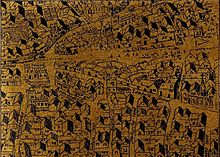| St Mary Woolchurch Haw [1] | |
|---|---|
 Current photo of site | |
 | |
| Location | Mansion House, London |
| Country | United Kingdom |
| Denomination | Church of England |
| History | |
| Founded | 13th century |
| Architecture | |
| Demolished | 1666 |
St Mary Woolchurch Haw was a parish church in the City of London, destroyed in the Great Fire of London of 1666 and not rebuilt.[2] It came within the ward of Walbrook.
History
[edit]
The church of St Mary Woolchurch Haw was an ancient foundation, dating from the time of William I, when it was given to the Abbot and Convent of St John's, Colchester, by Hubert of Ryes, who was the father of Eudo Dapifer, William's steward. In the Charter of Endowment, it is referred to as "St Mary of West Cheaping, which is called Newchurch"; the eastern end of Cheapside is now called Poultry.[3] It became the property of the crown after the dissolution.
The name is said to be derived from a beam that was once fixed in the churchyard, which was used for weighing wool. The church was rebuilt in the reign of Henry VI.[4] At the end of the sixteenth century John Stow described it as "reasonably fair and large",[5] and John Strype recorded that it was "richly repaired and beautified, at the Charge of the Parishioners" in 1629.[6]
St Mary Woolchurch Haw was one of the 86 parish churches destroyed by the Great Fire in 1666. The parish clerk and the sexton were able to rescue the "plate" (the silverware used during services), "the new great Bible" and some vestments; while the clerk was doing this, all his own property was burned.[7] In 1670 a Rebuilding Act was passed and a committee set up under the stewardship of Sir Christopher Wren to decide which would be rebuilt.[8] Fifty-one were chosen, but St Mary Woolchurch Haw was not among them.[9] The parish was united to that of St Mary Woolnoth.
The Mansion House now stands on the site.[4]
Present day
[edit]The parish now forms part of the combined parish of St Edmund the King and Martyr, and St Mary Woolnoth Lombard Street with St Nicholas Acons, All Hallows Lombard Street, St Benet Gracechurch, St Leonard Eastcheap, St Dionis Backchurch and St Mary Woolchurch Haw – usually shortened to "St Edmund & St Mary Woolnoth". It is part of the Church of England's Diocese of London.[10]
References
[edit]- ^ Dates of parish
- ^ "The London Encyclopaedia" Hibbert, C; Weinreb, D; Keay, J: London, Pan Macmillan, 1983 (rev 1993, 2008) ISBN 978-1405049245
- ^ Brooke, J M S (1886), The Transcript of the Registers of the United Parishes of S. Mary Woolnoth and S. Mary Woolchurch Haw in the City of London, from their Commencement 1538 to 1760, Bowles & Sons, London (p. 43)
- ^ a b White, J.G. (1901). The Churches and Chapels of Old London. London. pp. 133–134.
{{cite book}}: CS1 maint: location missing publisher (link) - ^ "A Survey of London, Vol I" Stow, J. p. 446 : Originally 1598 – this edn, London, A. Fullarton & Co, 1890
- ^ "Walbrook Ward. St. Mary Woollchurch". The Stuart London Project, Humanities Research Institute, The University of Sheffield. Retrieved 27 September 2011.
- ^ Brooke (pp. 56–57)
- ^ "Wren" Whinney,M London Thames & Hudson, 1971 ISBN 0500201129
- ^ "The City of London Churches" Betjeman, J. Andover, Pitkin, 1967 (rpnt 1992) ISBN 0853725659
- ^ Diocese of London St Edmund & St Mary Woolnoth